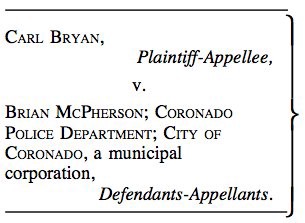Inconsistent Pleadings: Bryan v. McPherson, or, Don't Tase Me When I'm Pantsless, Bro
by Ian Retford

If you’re like most non-lawyers, you tend to ignore legal news unless it involves waterboarding, gays and/or fetuses. To be honest, I don’t blame you. The law is often boring, and the fact that all of your most socially numbing friends are lawyers isn’t helping things. But occasionally, something emanates from the crusty, jargon-filled world of old white people that, although not involving gays or proto-babies, kind of matters, and is worth knowing about. And that’s why we’re here. To take you around the legal globe, Len Berman style.
Our stop today? San Diego County, where 21-year-old Carl Bryan is driving, pantsless.
A somewhat insane Humbert Humbert-like driving tour has taken Bryan from his younger brother’s apartment in Ventura County, to his brother’s girlfriend’s place in Los Angeles, and finally, en route to his parents’ house in Coronado. Bryan’s first ticket of the morning, for speeding, is issued on Highway 405, between L.A. and San Diego.
Bryan’s second encounter with the police occurs a short time later, when Bryan is pulled over for driving without his seatbelt, which he apparently forgot to buckle after being pulled over the first time. Sad-sack Bryan more or less flips the fuck out, and while the officer is doing his thing, Bryan gets out of his car and begins, in varying combinations, crying, yelling, shouting nonsense, and, somewhat inexplicably, hitting his thighs.
This doesn’t sit well with the officer, who, from twenty or so feet away (and without warning), pulls the trigger on his taser gun, releasing a steel-barbed, aluminum-tipped dart that embeds itself into Bryan’s back and delivers a 1200 volt charge. Bryan falls face-forward and shatters four teeth. When his convulsions subside, Bryan is issued his second ticket of the day and arrested for resisting an officer.
So Bryan sues, claiming that it was not reasonable for the officer to deploy projectile voltage against a seemingly nutty-but ultimately harmless-pantsless dude who was pulled over for the most minor of traffic infractions. The trial court agreed, and the officer appealed the case to the Ninth Circuit Court of Appeals, which is the court that hears federal appeals from most states west of the Rockies (i.e. everything but Utah).
You may know the Ninth Circuit as the kinda kooky court that gets reversed by the Supreme Court more or less constantly. Well, in this case, the Ninth Circuit got all reasonable [PDF link to the decision] and said, in this decision that came down while we were all on holiday between Christmas and New Year’s, that, no, you can’t shoot someone with a taser gun for failing to wear a seatbelt and acting a little schizo. (The court did not clear up the mystery of Bryan’s pantslessness, unfortunately.)
And why does this matter, apart from the fact that Mr. Bryan can now hand the officer the bill for his teeth-capping expenses?
Well, for one thing, the opinion sends a fairly unmistakable message to police officers: chill out with the tasers already! The new rule in the Ninth Circuit-which, as mentioned, covers basically the entire western United States-is that an officer cannot tase a suspect unless he or she is either a flight risk, a dangerous felon, or an immediate physical threat to the officer or bystanders. In other words, tasers are to be used only when reasonably needed, not when a suspect is simply acting a little weird, or getting a little mouthy.
More broadly, the court’s opinion is a relatively infrequent example of judicial willingness to hold a police officer personally responsible for wild overreaction. Typically, police officers face civil liability for truly malevolent conduct, but anything that can be apparently be characterized as simply boneheaded-say, brandishing a gun at a snowball fight, or arresting a professor in his own home for being surly, or shooting a guy 41 times because you mistake his wallet for a gun-is beyond the scope of judicial second-guessing.
In the Bryan case, though, the court never questioned the good faith of the officer, or his legitimate interest in calming Bryan the hell down and putting some pants on him-but nonetheless found that deference to the officer’s chosen method of law enforcement wasn’t warranted. Which is good news for those of us who have observed that an officer’s tactics may be less a product of cold, rational decision-making than the fact that he’s really pissed that you gave him the Heisman stiff-arm.
Ian Retford is the pseudonym of a lawyer in New York City.
